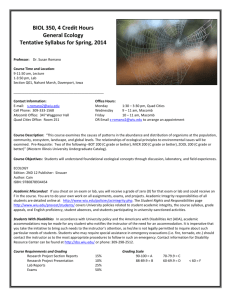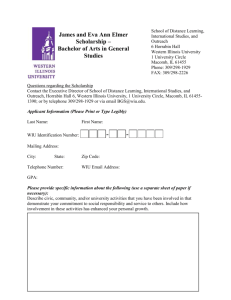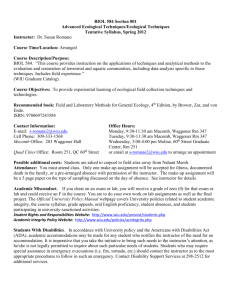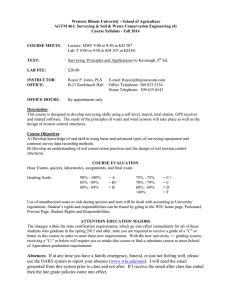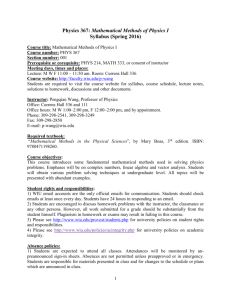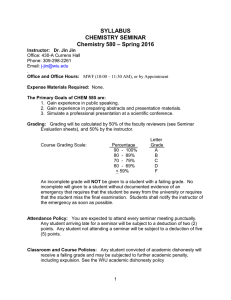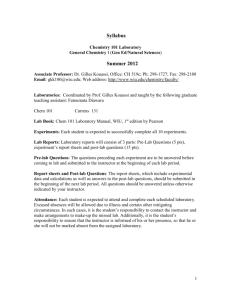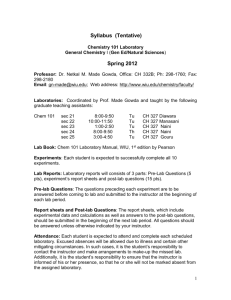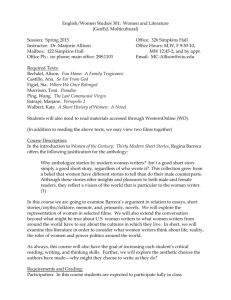biol 501 s. romano
advertisement
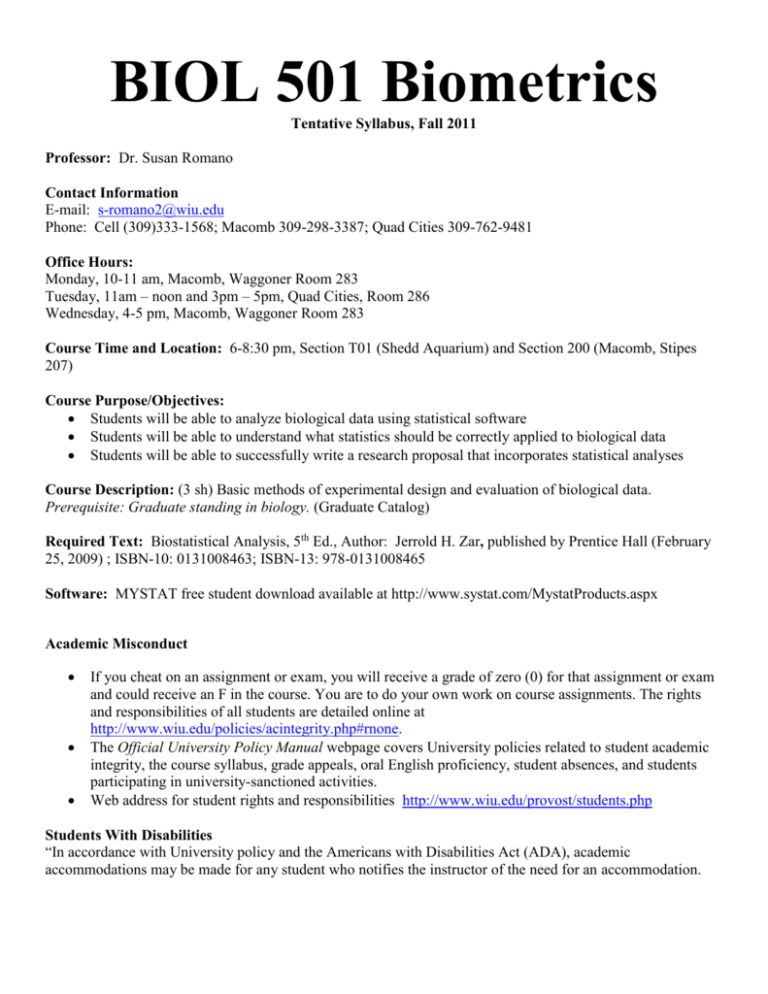
BIOL 501 Biometrics Tentative Syllabus, Fall 2011 Professor: Dr. Susan Romano Contact Information E-mail: s-romano2@wiu.edu Phone: Cell (309)333-1568; Macomb 309-298-3387; Quad Cities 309-762-9481 Office Hours: Monday, 10-11 am, Macomb, Waggoner Room 283 Tuesday, 11am – noon and 3pm – 5pm, Quad Cities, Room 286 Wednesday, 4-5 pm, Macomb, Waggoner Room 283 Course Time and Location: 6-8:30 pm, Section T01 (Shedd Aquarium) and Section 200 (Macomb, Stipes 207) Course Purpose/Objectives: Students will be able to analyze biological data using statistical software Students will be able to understand what statistics should be correctly applied to biological data Students will be able to successfully write a research proposal that incorporates statistical analyses Course Description: (3 sh) Basic methods of experimental design and evaluation of biological data. Prerequisite: Graduate standing in biology. (Graduate Catalog) Required Text: Biostatistical Analysis, 5th Ed., Author: Jerrold H. Zar, published by Prentice Hall (February 25, 2009) ; ISBN-10: 0131008463; ISBN-13: 978-0131008465 Software: MYSTAT free student download available at http://www.systat.com/MystatProducts.aspx Academic Misconduct If you cheat on an assignment or exam, you will receive a grade of zero (0) for that assignment or exam and could receive an F in the course. You are to do your own work on course assignments. The rights and responsibilities of all students are detailed online at http://www.wiu.edu/policies/acintegrity.php#rnone. The Official University Policy Manual webpage covers University policies related to student academic integrity, the course syllabus, grade appeals, oral English proficiency, student absences, and students participating in university-sanctioned activities. Web address for student rights and responsibilities http://www.wiu.edu/provost/students.php Students With Disabilities “In accordance with University policy and the Americans with Disabilities Act (ADA), academic accommodations may be made for any student who notifies the instructor of the need for an accommodation. For the instructor to provide the proper accommodation(s) you must obtain documentation of the need for an accommodation through Disability Resource Center (DRC) and provide it to the instructor. It is imperative that you take the initiative to bring such needs to the instructor's attention, as he/she is not legally permitted to inquire about such particular needs of students. Students who may require special assistance in emergency evacuations (i.e. fire, tornado, etc.) should contact the instructor as to the most appropriate procedures to follow in such an emergency. Contact Disability Resource Center (DRC) at 298-2512 for additional services.” WIU Policy Date August 24 August 31 September 7 September 14 September 21 September 28 October 5 October 12 October19 October 26 November 2 November 9 November 16 November 23 November 30 December 7 December 14 Chapter/Subject Chapter 1. Data: Types and Presentation Chapter 2. Populations and Samples Chapter 3. Measures of Central Tendency Chapter 4. Measures of Variability and Dispersion Chapter 7. One-Sample Hypotheses Chapter 8. Two-Sample Hypotheses Chapter 9. Paired-Sample Hypotheses Research Proposal discussion No Class (Upper Mississippi River Conference, Bettendorf, Iowa) Begin working on your Research Proposal Chapter 10. Multisample Hypotheses and ANOVA Chapter 11. Multiple Comparisons Midterm Exam Chapter 12. Two-Factor ANOVA Chapter 14. Multiway Factorial Analysis of Variance Chapter 16. Multivariate Analysis of Variance Chapter 17. Simple Linear Regression Chapter 21. Polynomial Regression Chapter 19. Simple Linear Correlation Chapter 23. Contingency Tables Thanksgiving Break Non-Parametric Analyses (Handout) Final Proposal Q&A (Proposal due Friday, December 9th, midnight) Final Exam COURSE REQUIREMENTS AND GRADING Points 2 Exams: 100 points each 200 10 Problem sets, 10 points each 100 1 Research Proposal - Concise proposal outlining an experiment of your choice providing details on data collection and statistical analysis 100 Total: 400 points Grading will be based on the following scale: 90-100%=A, 80-89.9%=B, 70-79.9%=C, 60-69.9%=D, less than 60%=F
